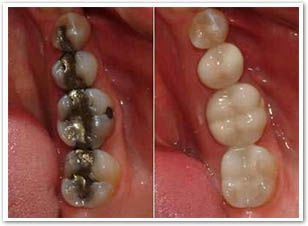Andrassy Dental - dental tourism

Porcelain inlays:
An inlay restoration is a custom made filling made of composite material, gold, or tooth-
colored porcelain. Porcelain inlays are popular because they resemble your natural
tooth. A porcelain inlay is made by a professional dental laboratory and is permanently
cemented into the tooth by your dentist.
Inlays can be utilized to conservatively repair teeth that have large defective fillings or
have been damaged by decay or trauma. Inlays are an ideal alternative to conventional
silver and composite fillings. Also, they are more conservative than crowns because less
tooth structure is removed in the preparation of inlays.
As with most dental restorations, inlays are not always permanent and may someday
require replacement. They are highly durable and will last many years, giving you a
beautiful long lasting smile.
Reasons for inlay restorations:
• Broken or fractured teeth.
• Cosmetic enhancement.
• Decayed teeth.
• Fractured fillings.
• Large fillings.
What does getting an inlay involve?
An inlay procedure usually requires two appointments. Your first appointment will
include taking several highly accurate impressions (molds) that will be used to create
your custom inlay and a temporary restoration.
While the tooth is numb, the dentist will remove any decay and/or old filling materials.
The space will then be thoroughly cleaned and carefully prepared, shaping the surface
to properly fit an inlay restoration. A temporary filling will be applied to protect the
tooth while your inlay is made by a dental laboratory.
At your second appointment your new inlay will be carefully and precisely cemented into
place. A few adjustments may be necessary to ensure a proper fit and that your bite is
comfortable.
You will receive care instruction at the conclusion of your treatment. Good oral hygiene
practices, a proper diet, and regular dental visits will aid in the life of your new inlay.
Porcelain onlays:
An onlay restoration is a custom made filling made of composite material, gold, or tooth-
colored porcelain. Porcelain onlays are popular because they resemble your natural
tooth. An onlay is sometimes also referred to as a partial crown. Porcelain onlays are
made by a professional dental laboratory and is permanently cemented onto the tooth
by your dentist.
Onlays can be utilized to conservatively repair teeth that have large defective fillings
or have been damaged by decay or trauma. Onlays are an ideal alternative to crowns
(caps) because less tooth structure is removed in the preparation of onlays. Onlays are
essentially identical to inlays with the exception that one or more of the chewing cusps
have also been affected and need to be included in the restoration.
As with most dental restorations, onlays are not always permanent and may someday
require replacement. They are highly durable and will last many years, giving you a
beautiful long lasting smile.
Reasons for onlay restorations:
• Broken or fractured teeth.
• Cosmetic enhancement.
• Decayed teeth.
• Fractured fillings.
• Large fillings.
What does getting an onlay involve?
An onlay procedure usually requires two appointments. Your first appointment will
include taking several highly accurate impressions (molds) that will be used to create
your custom onlay and a temporary restoration.
While the tooth is numb, the dentist will remove any decay and/or old filling materials.
The space will then be thoroughly cleaned and carefully prepared, shaping the surface
to properly fit an onlay restoration. A temporary filling will be applied to protect the
tooth while your onlay is made by a dental laboratory.
At your second appointment, your new onlay will be carefully and precisely cemented
into place. A few adjustments may be necessary to ensure a proper fit and that your
bite is comfortable.
You will receive care instruction at the conclusion of your treatment. Good oral hygiene
practices, a proper diet, and regular dental visits will aid in the life of your new onlay.
